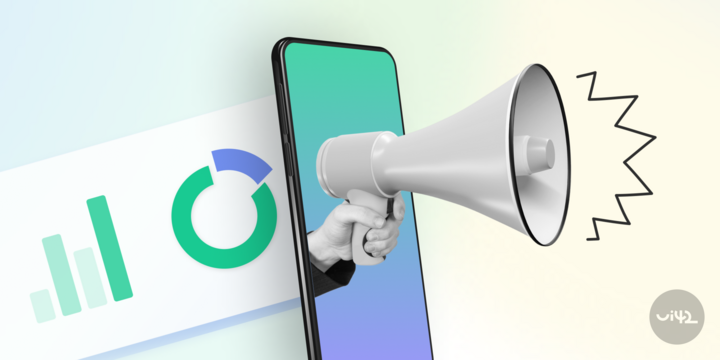Online marketing includes activities that you develop to promote a company, person, brand, product, or service through the internet. It can be a mention on social media, a banner ad in a paid campaign, or even a business card in Google My Business. What is the difference between online marketing and digital marketing? While in the case of online marketing, you distribute your content through the internet, digital marketing includes all digital media (television, radio, etc.).
Read about the benefits of online marketing that can also take your project a step further. What does it all cover?

What are the tools of online marketing?
The term online marketing encompasses a large number of activities that make brands and products visible on the internet. In the case of looking for online marketing experts, it is now true that a PPC specialist, SEO specialist, social media manager, UX specialist, copywriter, or ideally a one-stop shop agency that has all of these under one roof will look better at your project. Each of them masters the given online marketing tool in depth and can fully exploit its potential in your favor. What are they?
PPC advertising (Pay-per-click)
Pay-per-click advertising is one of the first options for doing online marketing. In addition to the most commonly used PPC advertising, where you pay when a user clicks on your ad (pay per click), there are several other types of paid advertising. An example is CPT/CPM, where the number of views (for example, of a banner ad) is charged.
In the case of PPC advertising, you also have several options to engage your audience:
- search ads (Search Ads)
- banner ads (Display Ads)
- social media ads (Social Ads)
- Google Shopping
- video ads (Youtube)
The biggest advantage of this online marketing tool is that you can turn off and turn on PPC advertising at any time, or change its settings and optimize it. And, of course, the fact that you pay for the ad only when the user clicks through it.
SEO (Search Engine Optimization)
Search engine optimization for a website is not a paid online marketing tool, but it requires the knowledge of an expert. In addition to technical SEO (page loading speed, website structure - sitemap, data structure, SSL certificates, etc.), there is also onpage and offpage SEO with a number of parameters that make a website more readable for search engines.
Why is it important? The better your website performs from the content side for search queries and from the technical side for the constantly increasing demands for speed, clarity, and availability for all types of devices (responsiveness), the better you will be placed in search results. The goal is to get to at least the first page of SERP (search results page), ideally on the first three positions after paid advertising. Because these are the results that people click on the most.
Content marketing
Content is the article that is currently being emphasized. There is no reason to be surprised, content marketing offers one of the best tools to turn a visitor into a paying customer. And create a competitive advantage for your e-commerce project without extra significant costs. Unique content is what sells and differentiates you from a competitor with the same product.
Well-written product descriptions will replace the seller in your e-shop. A blog with tips, advice, and bonus content will attract new customers, even across unpaid channels (SEO). And user-friendly texts within the purchase process will guide the customer through the purchase without putting obstacles in their way. If you can also process premium content in a form that people currently prefer (in addition to articles, these are audio recordings, podcasts, infographics, or videos), the results will not be long in coming.
Social media and influencer marketing
Social media marketing is closely related to content creation and PPC advertising, if you choose to run paid campaigns. Facebook, Instagram, Twitter, LinkedIn, or the current boom called TikTok have great targeting options for audiences, geographic, and demographic groups. This way, you can very precisely define who you want to show your ad to. In addition, it applies that it is a way to build closer contact with your customers and create a community.
When choosing the social media that you will define as your main communication channel, consider primarily where the largest group of your potential customers is located. From the content point of view, do not forget to set a consistent tone of voice, create posts that will ensure you organic reach (without paid advertising) and respond to comments under posts. Regular post creation and media plan should be a matter of course if you want to gain and maintain attention in the sea of competition.
E-mail marketing
Newsletter, as the core tool of e-mail marketing, is one of the first ways that brands and companies started to communicate with their customers. The basis is a database of contacts to which you can send newsletters. However, they do not have to be exclusively sales emails. You can inform your followers about company news or, for example, premium content in the article that you have just published on the blog.
E-mail marketing is a proven way to build relationships with customers and bring them back to your website. An interesting newsletter with a catchy subject increases interest and thus the desired conversion. In addition, this online marketing tool can be very precisely evaluated and also tested different versions or divided the database of contacts into different groups and thus send different offers.
Affiliate marketing
Using affiliate marketing, a relationship arises between the publisher (content creator, website owner) and the advertiser (product or service seller). The result is the mediation of a sale or other conversion in the online space. In simple terms, it works for example in such a way that the blog author writes an article in which he places a link to the selected product (inserts a generated affiliate link or banner with a link). When the article reader clicks on it and performs the desired action (purchase of goods, order of service, filling out a form), the publisher receives a commission from the advertiser. Such cooperation can be resolved through an affiliate network or in the case of larger companies often also individually.
Advantages of online marketing
The fundamental reason is that your potential customers are moving in the online space. After all, even in offline marketing, it doesn't make sense to place a banner in the middle of the forest where no one will see it. If we compare these two types of advertising, it is clear that online marketing has undeniable advantages.
- Online marketing is measurable It is difficult to estimate how many people at the bus stop will be addressed by your poster. Or how many of them will read your advertisement in the newspapers and react to it. However, if you decide on PPC advertising in a well-known online medium, on Facebook or directly in search, you always know exactly how many of them responded and even made a conversion. Online marketing tools are easy to measure. You can evaluate them, test them, compare them, and reassess your strategy based on the results.
- Online marketing is targeted and addressed Thanks to the available data that internet users provide about themselves, you can show handbag ads to a woman who is interested in fashion. Or target a post about smartphone news at a college student who is interested in technology. Even within individual tools, you can create specific audiences - target groups with the same parameters (age, gender, interests…) and segment your advertising messages according to them.
- Global options for smaller players and local targeting The tentacles of the internet and the online world have no limitations in terms of the size of the company. Even a small e-shop can reach the same large audience as a well-known global retailer. And feel free to expand abroad as well. On the other hand, local optimization also has great power, thanks to which you can use campaigns and, for example, appropriately selected keywords to reach people in your area and thus appropriately connect your online business with a brick-and-mortar store.
- You will appreciate lower overhead costs Forget about the costs of printing flyers, banners, citylights, promoters, travel costs, accommodation, and the like. Online marketing, compared to print advertising, will make a slightly smaller hole in your advertising budget. Of course, web graphics and the experience of online marketers also cost something, but there are some tools that you can take under your thumb yourself. If you orient yourself a bit, you can manage to create unique content with added value - whether on a blog or on social networks - yourself at the beginning.
How to do online marketing?
Since online marketing and, to some extent, digital marketing are among the relatively young branches of advertising, a lot of information can be found on the internet. In addition, it applies that online advertising is constantly evolving. Trends are emerging, user needs are changing, and the algorithms of various online marketing tools are also changing.
When we add to this the emergence of new channels and methods of promotion (social networks, podcasts…), it is clear that without up-to-date information, traditional activities on the internet will be ineffective. As a result of advertising blindness, advertising formats require a good dose of creativity, and the constantly increasing demands in favor of the user - the visitor to the page - put pressure on the constant optimization of visual and functional aspects.
While, on the one hand, it is true that the background of online marketing is easily accessible to everyone, each of its branches requires knowledge and time, without which your online promotion will not be effective. So, if you are not going to immerse yourself in its depths fully, the solution is to entrust these tasks to experts. Either partially or, ideally, comprehensively - on the basis of a quality online marketing strategy. Do you need one? At ui42 you will find experts in all the mentioned (and many other) branches under one roof. We would be happy to take a look at your online project.












